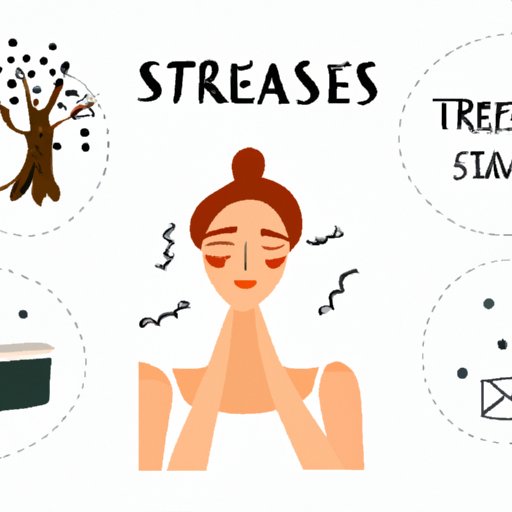
I. Introduction
If you’ve experienced stress acne, you know it can feel like your skin is constantly against you. Stress acne occurs when chronic stress and anxiety causes an increase in the production of androgen hormones, which stimulate the oil glands and hair follicles in your skin, leading to pimples, blackheads, and cystic acne.
In this article, we will explore the link between stress and acne breakouts, as well as share tips on how to manage skin affected by stress. You’ll learn about topical treatments, adjusting your skincare routine, making dietary changes, stress reduction techniques, and when it’s time to seek professional help.
II. The link between stress and acne
Stress is a common cause of acne breakouts. When you’re stressed, your body produces an excess of androgen hormones. These hormones stimulate the oil glands in your skin, leading to clogged pores and breakouts. Stress also impacts your immune system by triggering inflammation and making it more difficult for your body to fight off acne-causing bacteria.
To prevent acne breakouts caused by stress, it’s important to manage your stress levels. Regular exercise, meditation, and journaling are effective stress-management techniques that can help reduce acne breakouts caused by stress.
III. Topical treatments for stress acne
Topical treatments are an effective way to manage stress acne. Salicylic acid, benzoyl peroxide, and tea tree oil are all popular options that work by exfoliating the skin, killing acne-causing bacteria, and reducing inflammation. It’s important to use these treatments appropriately and safely to prevent skin irritation. It’s also important to recognize which topical treatment will work best for your acne type.
IV. Adjusting your skincare routine
Stress can also impact your regular skincare routine. It’s important to focus on gentle cleansing and exfoliation, especially if your acne is already inflamed or cystic. Incorporating additional skincare items such as face masks and toners can also help. When adjusting your skincare routine, make sure to use products that won’t further irritate your skin and cause more breakouts.
V. Making dietary changes
What you eat can have a significant impact on acne. Foods high in sugar and dairy products are known to trigger breakouts, while foods high in vitamin A and zinc can help prevent breakouts. Drinking more water and eating a balanced diet can also help reduce stress and keep your skin healthy.
VI. Stress reduction techniques
Stress reduction techniques such as yoga and meditation can help prevent acne breakouts by reducing stress levels. Incorporating these techniques into your daily routine can help reduce the intensity and frequency of stress acne. Aromatherapy and massage are also effective stress management techniques that can help promote relaxation and reduce stress levels.
VII. Seeking professional help
If stress acne is significantly impacting your mental or physical health, it’s important to seek professional help. Dermatologists and mental health professionals can help provide effective treatments and therapies for stress-acne. It’s important to find the right healthcare provider that can help with both stress acne and any underlying mental health issues.
VIII. Conclusion
Stress acne can be a frustrating problem, but it can be managed by reducing stress levels and making lifestyle changes. Topical treatments, adjusting your skincare routine, making dietary changes, and stress reduction techniques are all effective ways to prevent and manage stress acne. If stress acne is significantly impacting your well-being, it’s important to seek professional help and prioritize your mental and physical health.





